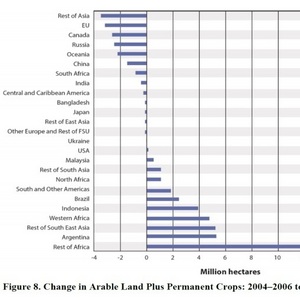RFA to CARB: Use real-world data to revise ILUC analysis

Renewable Fuels Association
February 17, 2015
BY Renewable Fuels Association
The Renewable Fuels Association submitted comments on Monday calling on the California Air Resources Board to revise its Low Carbon Fuel Standard re-adoption proposal to reflect recent scientific advances and new empirical data regarding the actual impacts of biofuels on global land use patterns.
In comments submitted to CARB Chairwoman Mary Nichols, RFA noted that while steps have been taken to slightly improve the program in the re-adoption proposal, RFA remains “deeply concerned by several aspects of the proposal,” noting that CARB’s inclusion of a flawed indirect land use (ILUC) change analysis “threatens the long-term durability of the LCFS program.”
Advertisement
Advertisement
RFA points to the central role that grain-based ethanol has played in LCFS compliance over the past four years, noting that nearly 60 percent of all LCFS credits were generated by ethanol. Yet, despite the vital importance of grain ethanol to the program, the proposed ILUC penalty assessed against corn ethanol “will make the use of most grain ethanol infeasible for compliance as early as 2016.”
The comments explain that “CARB’s ILUC analysis remains technically and methodologically flawed, and grossly overstates the land use impacts associated with biofuels expansion.” RFA points to a recent study by Iowa State University that finds the world’s farmers have responded to increased demand for crops by using existing cropland more efficiently—not by converting native forest and grassland to cropland, as assumed by CARB. RFA notes that, “For the first time, we have real-world data that provides important insight into actual market responses to increased biofuels demand and higher crop prices.” Accordingly, RFA calls on CARB to “take into account the new CARD/ISU research” and use the real-world data to “immediately re-calibrate” the land use model used to derive penalties against biofuels.
Advertisement
Advertisement
Related Stories
President Trump on July 4 signed the “One Big Beautiful Bill Act.” The legislation extends and updates the 45Z credit and revives a tax credit benefiting small biodiesel producers but repeals several other bioenergy-related tax incentives.
CARB on June 27 announced amendments to the state’s LCFS regulations will take effect beginning on July 1. The amended regulations were approved by the agency in November 2024, but implementation was delayed due to regulatory clarity issues.
SAF Magazine and the Commercial Aviation Alternative Fuels Initiative announced the preliminary agenda for the North American SAF Conference and Expo, being held Sept. 22-24 at the Minneapolis Convention Center in Minneapolis, Minnesota.
International Sustainability & Carbon Certification has announced that Environment and Climate Change Canada has approved ISCC as a certification scheme in line with its sustainability criteria under its Clean Fuel Regulations.
Legislation introduced in the California Senate on June 23 aims to cap the price of Low Carbon Fuel Standard credits as part of a larger effort to overhaul the state’s fuel regulations and mitigate rising gas prices.
Upcoming Events









